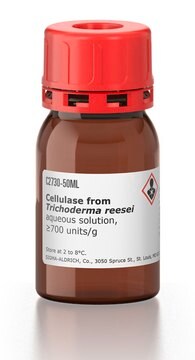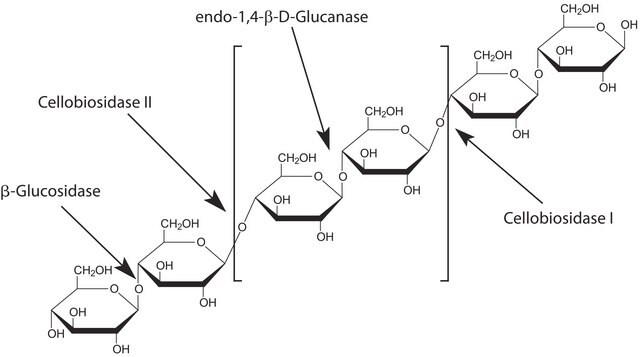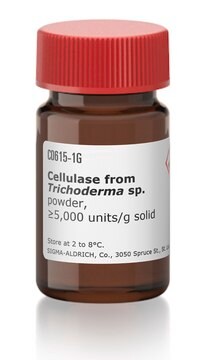C9499
Cellulase, thermostable from Clostridium thermocellum
recombinant, expressed in E. coli, ≥90% (SDS-PAGE)
Synonym(s):
1,4-(1,3:1,4)-β-D-Glucan 4-glucano-hydrolase
About This Item
Recommended Products
recombinant
expressed in E. coli
Quality Level
Assay
≥90% (SDS-PAGE)
form
liquid
specific activity
≥40 units/mg protein
mol wt
41 kDa
concentration
19-21 mg protein/mL (UV)
shipped in
wet ice
storage temp.
2-8°C
Application
Biochem/physiol Actions
Unit Definition
Physical form
Storage Class Code
10 - Combustible liquids
WGK
WGK 2
Flash Point(F)
Not applicable
Flash Point(C)
Not applicable
Regulatory Listings
Regulatory Listings are mainly provided for chemical products. Only limited information can be provided here for non-chemical products. No entry means none of the components are listed. It is the user’s obligation to ensure the safe and legal use of the product.
JAN Code
C9499-BULK:
C9499-2MG:
C9499-VAR:
Certificates of Analysis (COA)
Search for Certificates of Analysis (COA) by entering the products Lot/Batch Number. Lot and Batch Numbers can be found on a product’s label following the words ‘Lot’ or ‘Batch’.
Already Own This Product?
Find documentation for the products that you have recently purchased in the Document Library.
Our team of scientists has experience in all areas of research including Life Science, Material Science, Chemical Synthesis, Chromatography, Analytical and many others.
Contact Technical Service






